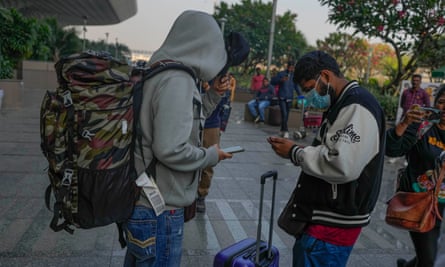The arrest in France of a Nicaragua-bound charter plane has renewed attention on the Central American country’s role as a springboard for migrants from around the world seeking to make their way to the United States .
The plane, which left the United Arab Emirates on December 21 with 303 passengers of Indian nationality, was grounded during a refueling stopover after an anonymous tip alleging human trafficking.
However, the passengers were not being trafficked against their will, but rather were attempting to migrate.
Nicaragua is the closest country connected by land to the United States and does not impose strict entry requirements on citizens of many countries who are prohibited from flying to other destinations without a visa.
While some countries have imposed visa requirements on certain nationalities under pressure from Washington, experts say Nicaraguan President Daniel Ortega has taken a contrarian approach in an attempt to weaponize migration and force negotiations on the sanctions imposed on members of his entourage.
“Ortega is very astute in playing with what hurts the most in the United States,” said Ana María Méndez, director for Central America at the Washington Office on Latin America, referring to the current migrant crisis. and the political responsibility it represents for President Joe. Biden is heading to the 2024 election. “It’s like pouring alcohol on an open wound.”
In 2014, as a new migration crisis erupted, Nicaragua imposed visa requirements on Cuban citizens to help stem the flow of migrants heading toward the U.S. border. But since then, relations between the two countries have deteriorated due to Ortega’s rigging of the 2021 elections and a series of human rights violations.
Following political upheaval in Cuba during the summer of 2021, Ortega canceled visa requirements for Cuban citizens. Charter flights from the island began soon after as a sort of “safety valve” for the Cuban government, which preferred to see people leave rather than protest in the streets, Méndez said.
Eventually, citizens of other countries, such as Haiti, followed suit in order to shorten their journey to the United States and avoid the dangerous Darién Gap route along Panama’s southern border.
Because of frosty relations with Ortega, the Biden administration has tried to bypass the Nicaraguan government to stop charter flights full of migrants coming from further and further afield.
On October 30, the Haitian government banned charter flights to Nicaragua, which in the previous three months had carried around 30,000 people. As a result, the number of Haitians traveling north by land through Honduras fell dramatically in November.
Then, on November 21, the State Department announced a new visa restriction policy targeting “owners, managers and/or senior officials of companies offering charter flights to Nicaragua intended primarily for irregular migrants to the United States.”
Several charter companies have stopped their flights, but some seem undeterred. Among them is Romania-based Legend Airlines, which this month sent the first direct flight from Europe to Nicaragua in years and was responsible for the plane grounded in France.
The flight from France was ultimately diverted to India, without two passengers who were detained for further investigation and 25 others who decided to seek asylum instead of returning to their home countries.
India has opened its own investigation into this flight, whose passengers allegedly paid between $48,000 and $150,000 to board, an Indian police official told AFP. About 100,000 Indian nationals arrived at the US-Mexico border in 2023, more than 10 times the number in 2019.
Meanwhile, flights from Cuba continue to arrive in Managua via an airline owned by the Venezuelan government, which appears unconcerned about sanctions but is also engaged in its own negotiations with the White House after the breakup relations under the administration of the former president. Donald Trump.
On social media, so-called travel agencies advertise Venezuelan airline flights from Havana to Managua for around $1,500, as well as all-inclusive packages for $4,000 and up that include services such as transportation to the Mexico, meals, accommodation and even assistance navigating the country. The U.S. Customs and Border Protection’s CBP One app, used by migrants to, among other things, make appointments to apply for asylum.
“The airlines and travel agencies that facilitate this are the new coyotes,” Méndez said, using a term for illicit smugglers.




